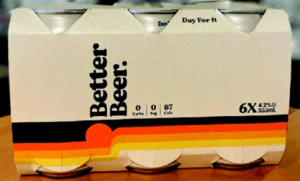Better Beer Co, the brainchild of The Inspired Unemployed and Torquay Beverage Co Pty Ltd, has prevailed in a dispute against Brick Lane Brewing over its carb-free beverage branded Better Beer.
Brick Lane Brewing commenced proceedings against Better Beer in 2021 alleging that the promotion and sale of Better Beer in a get-up similar to Brick Lane’s Sidewinder low alcohol Hazy Pale beer was misleading and deceptive or a false representation under the Australian Consumer Law.
 |
 |
The Sidewinder beer was launched 5 days before Better Beer was announced. The latter immediately came to the attention of Brick Lane, with the head of brand and innovation said to be “spewing” but confident that Brick Lane would “blow them outta the water with a cracking fully integrated comms plan”.
Despite the similarities, there was no allegation that Better Beer had copied the Sidewinder design. The parties accepted that the two concepts were developed concurrently, and without knowledge of each other. Indeed, although Sidewinder was available for purchase almost three months before Better Beer, the brands essentially built their reputations in the market side by side.
Justice Stewart considered that there were distinct similarities in the get-up both brands, in particular the curved stripes in blue, orange and yellow on an off-white background. Both get-ups were presented to and promoted in the market at essentially the same time. Despite Brick Lane winning the race to market, it had not established any appreciable reputation for its get-up of the Sidewinder product before the launch of Better Beer.
Relevantly, despite the similarities in get-up, Justice Stewart considered that each product bore a distinctive brand name – Sidewinder; unique and powerful, and Better Beer; alliterative and catchy – each of which looked and sounded very different to each other.
Although his Honour accepted that there was evidence of actual confusion, he found that it didn’t go very far, noting “in both cases the relevant observer – the cleaner at the GABS festival and the Dan Murphy’s employee – had only a fleeting observation of the Sidewinder get-up. They were, at most, momentarily confused about the products, but were not misled or deceived in a material sense, eg, by being led to purchase the wrong product.” Justice Stewart held that, on the authorities, two isolated incidents were statistically insignificant and of peripheral value and could only be used to support a finding that the relevant conduct is objectively misleading or deceptive and not to reach such a finding.
Ultimately, Justice Stewart was not satisfied that the hypothetical reasonable consumer of beer would, at the relevant date, have had any particular familiarity with Brick Lane’s Sidewinder get-up. If they did, they would not have been likely to be misled by the similarity of the respective products as a result in particular of the distinctive names used as well as the differences between the get-ups and the features of the relevant market.
Interestingly, Brick Lane argued that beer was a fast-moving consumer good at a relatively low price such that consumers would not be likely to give much attention to, or spend much time on, deciding on their purchase and were thus more likely to be confused.
However, in a nod to the ever growing craft beer market in Australia, Justice Stewart considered that because of the huge variety in beers and the way in which they are presented, the hypothetical reasonable beer purchaser is likely to have to pay close attention to just what it is that they are taking off the shelf, or clicking on, in a crowded and bewildering market so as to be able to distinguish between low alcohol and low carbohydrate products and to notice the names of the relevant products.
His Honour observed, quite rightly according to this author that a “consumer wanting a low alcohol beer will be disappointed to find that they had erroneously bought a low carbohydrate full strength alcohol beer, and vice versa. Someone wanting a lager or a pilsner will be disappointed if they erroneously walk out with a pale ale, and so on.”

